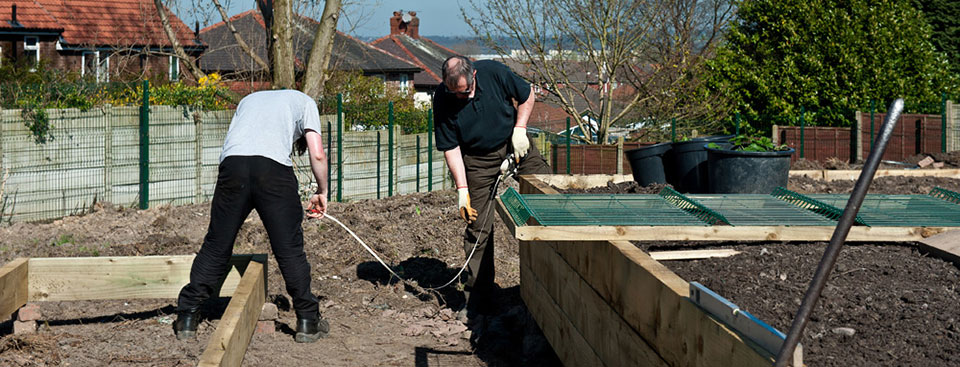


Info Sheets Home - Polytunnels & Greenhouses - Community Allotments - Planting Guides - Organic Food Growing - Pests & Diseases
What you want your group to do will determine the processes and set up you will need. Your group can be loosely organised with just a joint aim or purpose keeping you together, which is fine in many circumstances especially at an early stage when forming ideas and action plans. However if the group wishes to apply for funding or to approach councils etc for leases on land then the group will need to be constituted with a bank account and some sort of insurance.
Basically like minded people. You will also need certain people to make more of a commitment if you are to be constituted. There will need to be at least 3 formal members to form the board. These will need to be a Chairman, a Treasurer and a Secretary. Each role has its responsibilities. The Chairman presides over each meeting, obviously the Treasurer is responsible for keeping clear records of all money in and out and the secretary mainly takes meeting minutes, forms the meeting agendas and takes care of general admin. You may also want to appoint ‘vice’ members in case of absence
A constitution is basically a document that outlines the name of the group, how many members there will be (main board of trustees) the joint aims of the group, joining procedures, how many times the group will meet etc. It sounds very formal but as the group grows it will help when decisions need to be made. It also gives the group a certain amount of credibility when approaching councils etc. The constitution will need to be signed by the Chairman and at least 2 other members.
Click here to download a sample constitution
If the group plans to apply for grants or if the growing area is sited on council property then yes you will need insurance. BTCV offers one of the cheapest community group insurance if you become a member of their Community Network.
www.btcv.org.uk/display/community_network
Again there are other insurance deals if you look around.
Obviously the first thing you’ll need is a site on which to base your allotment. These can be hard to come by so you’ll need to think ‘outside the box’. Your first port of call should be the council or local housing associations to see if they have any unused land that they may be willing to lease out. However most councils may not consider certain unused land as possible allotment sites because of their location or the state they are in. You may therefore in your travels spy plots of land that aren’t particularly attractive or aren’t in very desirable areas, but with a bit of work these sites could offer a keen group of people a growing area. The council will want to know that your group is well set up with a certain amount of organisation e.g. regular meetings, boards of trustees etc, but they will be keen (in most circumstances) to oblige as of course the more people using their sites will benefit them.
A successful example of this can be seen in Bury at Philips Park. A new Incredible Edible (Incred Ed) group approached Philips Park ranger and staff directly to ask if there was any spare land that could be used for food growing, the answer was yes. So Incred Ed then contacted the manager of Bury green spaces and arranged a meeting. Now 8 months later they have transformed an area of Philips Park into a fruit growing area.. It can be done!
Once you have identified a possible site and the council are sounding positive, if this site is in a built up area the support and help of the local community is paramount. Most communities will have committees, or Tenants and Residents Associations (TRAs) or a Parish council etc who will have regular meetings to discuss local issues. If this area is managed by a Housing Association (if unsure ask your council) contact them first as they will have strong links with the people you will need to meet. Or make direct contact with a member of the board of trustees (Chairman, Secretary…) and request that your proposal be added to the agenda for the next meeting. Then it will be a case of developing support for your project. The more people you have supporting your proposal the easier it will be for all stages of the project.
How do I find out who owns this land?
I’ve heard about soil contamination in industrial areas. How do I know if the soil is safe?
In order for your group to use or develop a site, a landowner will need some form of agreement. This is designed to protect both parties so the landowner ensures that their land is being using appropriately, and you and your group are given certain rights, for example, so they cannot suddenly chuck you all off the site without warning! It will also allow you and the landowner to formally agree certain things, such as access, whether small buildings (sheds) or livestock will be allowed, and what responsibilities, if any, the landowner is willing to take on e.g. repairing surrounding fencing or access gates etc. It's best to think of every eventuality you can and discuss it before anything is signed.
The simplest form of agreement is a tenancy agreement, such as the agreement between an individual plot holder and an allotment owner (e.g. the council). Usually this sort of agreement is renewed annually. If the group wishes to take on and develop a large piece of land with a view to renting out plots to individuals then a short term agreement might be insufficient, especially if you intend to apply for funding of £5000 or more to develop the project. In this case a lease is required. A lease is obviously a longer document, although this doesn’t necessarily mean you will be taking on significantly greater responsibilities, but obtaining a lease can be quite a long winded process and will often involve the use of solicitors to look over the agreement. Whether or not you involve a solicitor it is important to be very clear about the responsibilities you are taking on in signing a lease, and whether you are confident you can or should fulfil them.
Once you have established your site you will need to draw up your own tenancy agreement for individual plot holders, which will obviously be much shorter but should be based on ensuring you comply with your lease. See the next section (Site rules) for more information on tenancy agreements for plot holders.
If your group plans to spend money on the chosen site and/or project then opening a bank account will be the best solution to legitimately and safely keep the group's money. Most groups at some point will also apply for grants for their projects and any grant making organisation, or councils etc will require proof of a bank account and the amount of money the group handles.
As previously mentioned you will need to be a constituted group with at least 3 board members in order to open a bank account. The board members will also need to be the signatories and I would advise you to have 4 signatories as although that seems a lot some grant making organisations will ask for this and you don’t want to be caught out on technicalities when applying for money! You can apply for a particular type of account especially for community groups. Not all banks offer community bank accounts however here are links to some that do:
There are more out there, take a look.
Unfortunately money does make the world go round and although your group may have many ideas on where to save money at some point you will probably need more money than you’ve got! There are lots of ways in which to raise money. You may opt to sell some of your produce, check with the councils H&S department if this is OK, it usually is. Or you could have an open day and make some produce to sell, cups of tea etc, again check with council. If there is a farm shop nearby they may be willing to take some produce to sell for you, especially if it’s a bit unusual e.g. Jerusalem/Globe artichoke.
The other option is to apply for a grant. A grant unlike a loan doesn’t need to be paid back. But there will be stipulations on what you can spend the money on and you will usually need to supply proof of spending and in some cases numbers of people that has benefitted from your grant. The stipulations and reporting will get stricter the more money you ask for. See below for some ideas of where to apply for money from. There will be small pots of money for £100-£10,000 to grants for large sums of money £25,000 plus. There are in general 3 types of funding strands –
Local sources of funding
For some other places to possibly get funding download:
If your group is responsible for the allotment site and you will be handing out allotment plots to others then you will be responsible for the overall upkeep of the site and making sure everyone else adheres to the lease or agreement that you have signed with the landowner. One option is to include these terms when you are drawing up your tenancy agreement for your plot holders. Below is an example tenancy agreement which does that. Another option is to keep the tenancy agreement very simple and simply include a condition that plot holders abide by certain site rules. This may give you the option to amend site rules without having to renew everybody’s tenancy agreements.
Although some people may not like the idea of insisting on rules for the allotment plots it is really important that you consider this option, particularly as your own lease will stipulate certain conditions which all plot holders will have to abide by. Site rules will give plot owners a clear idea of what is expected of them and what is and is not allowed. It is important to have a system for dealing with problems that is fair, open, and pre-agreed with tenants, and it is also important to ensure good communication between tenants and the management group. This will hopefully lead to a more peaceful allotment site and allow you to dissipate any grievances quickly and calmly. The sample tenancy agreement below includes conditions which could alternatively be drawn up as a separate site rules document you can always add extra terms depending on your own requirements and the stipulations of your own site lease.
Click here to download a sample tenancy agreement
So hopefully your group now has a site and an idea of where to get money if need be….
You may now want to think about what will be on your site. Some sites will be very basic and others may provide a building/hut for a central meeting place perhaps a toilet and even somewhere to make a cup of tea. All of this will require planning permission and cost money but it is possible. At the very least most allotments will provide water even if its one central tap from which to fill a can.
Many allotments allow small sheds to be erected on individual plots which will allow people to store tools on site rather than bring them on each visit. However people may be reluctant to do this if security is a worry. Depending on where your site is you may need to think about varying degrees of security measures. You can apply for grants for fences for the perimeter and/or secure metal units to act as storage units or meeting rooms. This will hopefully allow for secure storage and a reduction in vandalism.